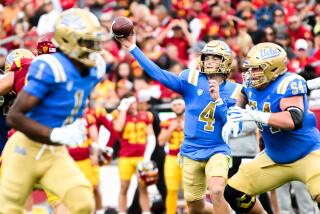NFL myths: Some players may be ‘$10-million guys,’ but not all of them are rich
- Share via
There are many myths about what happens inside and outside locker rooms in the NFL. As Super Bowl LII approaches, The Times will examine some of these assumptions over five days. Part 4: All players are rich.
In what would be his 19th year in the NFL, Tom Brady is scheduled to earn $22 million next season. Fletcher Cox will be paid $17.9 million.
The New England Patriots quarterback and the Philadelphia Eagles defensive tackle, who will face off Feb. 4 in Super Bowl LII, will be among the NFL’s highest-paid players at their positions.
But for every Brady and Cox — and players such as Detroit Lions quarterback Matthew Stafford, who will earn $26.5 million in salary and bonuses — there are hundreds of players making the NFL minimum based on their years of experience. This season, that was $465,000 for first-year players.
It’s a high wage, but in a league that features an average career length of fewer than three years, players, agents and executives say it is not true that all NFL players are rich.
“Big-time myth,” Patriots special teams standout Matthew Slater said. “Big time.”
Slater, a 10th-year pro, was standing in the locker room after the Patriots’ AFC championship game victory over the Jacksonville Jaguars last weekend.
For the third time in four years, the defending Super Bowl champion Patriots had reached the ultimate destination in a league that was estimated to generate about $14 billion in revenue in 2017, according to SportsBusiness Journal.
Star players command star salaries.
Most others, however, do not make tens of millions.
“We’re very fortunate, financially, to be able to do what we’re doing: Play a game, a child’s game, and be compensated for it,” said Slater, who had a salary-cap number of $1.6 million this season. “But everyone’s not making multimillion dollars.
“There are guys in this league that play on four or five teams in the same year. They’re on practice squads, and they’re scrapping and clawing and trying to provide for themselves and their family.
“That’s the majority of the guys in this league, honestly. I don’t want to say that we’re not blessed, that we’re not fortunate to do what we do. But the reality is there are not a lot of multimillionaires walking around.”
The median household income in the United States in 2016 was $59,039, according to the U.S. Census Bureau.
The average NFL player salary this season was $2.7 million, according to SportingIntelligence.com. That’s far less than the $7.1 million average of NBA players and $4 million of major league baseball players.
“Compared to their counterparts in baseball and the NBA, they’re not rich — unless you’re a quarterback,” said Joel Corry, a former agent who writes about NFL contracts and the salary cap for CBSSports.com and the NationalFootballPost.com.
The NFL salary cap this season was $167 million, divided among 53 players. If the salaries were divided evenly, that would be $3.2 million per player.
The Patriots roster features three players with salary-cap numbers of $10.9 million or more. Three players earned between $6 million and $8.5 million, eight made $3 million to $5 million and 17 earned between $1 million and $3 million. Twenty-one were paid less than $1 million, according to spotrac.com.
The Eagles roster includes one player at $10 million or more — receiver Alshon Jeffery, at nearly $10.8 million — and eight between $6 million and $9.8 million. Seventeen earned between $1 million and $6.2 million, and 27 had salary-cap numbers of less than $1 million.
Each NFL team also can carry 10 practice-squad players, who this season earned a minimum of $7,200 per week. NFL players on active rosters are paid salaries only during the 17 weeks of the regular season. If a practice player had lasted an entire season, their salary was $122,400.
Once the playoffs begin, players on participating teams all earn the same amount. Players for the Patriots and Eagles earned $28,000 for winning their divisional-round games and $51,000 for winning the conference championship games.
Players on the Super Bowl winner will earn $112,000, the loser $56,000.
Managing salaries while putting together a roster is “very similar to a household budget,” Rams general manager Les Snead said.
Many successful teams have a solidified starting quarterback — one not playing on a rookie contract — at the top of their pay scale “and you work down from there,” Snead said.
There might be a few “$10-million guys,” Snead said, “but after you have a subset of that, you have — hey, let’s call it the guys with minimum salaries you’ve got to have. So where does that help or hurt in the depth and special teams and all that?”
The Patriots “are in a league of their own” when it comes to building a cost-efficient roster, Corry said, because the 40-year-old Brady has been willing to take less than market value.
“When you can get your quarterback to not take top dollar and give home-team discounts consistently, that comes up in negotiations with other players,” Corry said, adding, “And then some people will ring chase after they’ve made some money. They’ll decide, ‘You know, I’ve been playing on losing teams forever. I want to get a ring. I’ll play for way below my market value for a year or two or so to maximize my chances for getting a championship.’
“That won’t happen early in a career but it will happen later.”
The Eagles have built their roster by being proactive in “identifying core players and signing them to extensions at the earliest possible instance,” Corry said, citing extensions given to receiver Alshon Jeffery and defensive lineman Timmy Jernigan as examples.
But most NFL players will be fortunate to even reach a second contract.
The average length of an NFL player’s career is not quite three years, according to a 2016 study by the Wall Street Journal, which analyzed data from 2008 to 2014.
That makes it difficult to build wealth over time.
“If you start your career at 23 years old,” Slater said, “and you come out and you play three years, you’re 26 years old. And you’re surely not ready to retire.
“You’ve got a lot of life ahead of you. You’ve got to provide for your family you’ve got to try to do what you need to do.
“I always tell people this is the best temporary job you’ll ever have.”
Rookie offensive lineman Cole Croston signed with the Patriots as an undrafted free agent last May.
Croston, 24, made the minimum $465,000. He said “you don’t really look at the numbers that’s on the check” because it’s “incredible” to get paid for playing a sport he loves.
“It’s almost like we’re not going to work because we love what we’re doing every day,” he said.
But Croston is aware of the length of most NFL careers.
“The tough thing in the NFL is sticking around,” he said. “A lot of people say the NFL stands for ‘Not For Long.’
“So the longer you can stay in the league the checks start adding up, sure. But you’ve got to stay in the league first.”
Follow Gary Klein on Twitter @latimesklein
More to Read
Go beyond the scoreboard
Get the latest on L.A.'s teams in the daily Sports Report newsletter.
You may occasionally receive promotional content from the Los Angeles Times.











